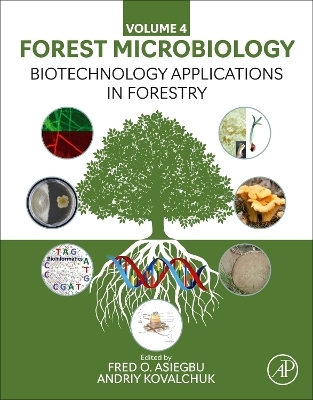
Biotechnology Applications in Forestry
Academic Press Inc (Verlag)
978-0-443-21903-0 (ISBN)
- Noch nicht erschienen (ca. Februar 2025)
- Versandkostenfrei innerhalb Deutschlands
- Auch auf Rechnung
- Verfügbarkeit in der Filiale vor Ort prüfen
- Artikel merken
Dr Asiegbu has been the professor of forest pathology at the University of Helsinki since 2007. He has a master’s degree in applied microbiology and plant pathology, and a PhD in biotechnology. His major research focus has been the application of biotechnology knowledge and tools for the determination of ecological, molecular and biochemical pathways required by emerging fungal and forest pathogens to spread, infect and cause disease to trees worldwide. He has been a member of the faculty interdisciplinary Master's Programme in Biotechnology and is also an invited professor at Nanjing Forestry University in China. Dr Kovalchuk is a researcher at the University of Helsinki. He has a PhD in molecular biology and has over 30 peer-reviewed journal publications on forest microbiomes.
Section A. Basis of Biotechnology
1. Historical background on Biotechnology
2. Introduction to Genomics
3. Next Generation Sequencing (NGS): principles and technical considerations
4. Introductory applied bioinformatics
5. Phylogenetics: Molecular phylogeny & Evolution
Section B: Biocontrol
6. Fungi in the biocontrol of forest insect pests
7. Bacteria in the biocontrol of forest insect pests
8. Microbial control of weeds and invasive plant species
9. Use of phages for the control of bacteria diseases of trees
10. Production; manufacture and regulatory consideration for registration of biocontrol agents
Section C: Biofertilizers & Soil fertility
11. Nitrogen-fixing organisms
12. Arbuscular mycorrhizal fungi
13. Biochar in forestry
Section D: Bioremediation
14. Fungi as bioremediation agents
15. Bacteria as bioremediation agents
16. Phytoremediation
Section E: Non-wood forest products
17. Strain collections; screening of strains for potential industrial applications; strain improvement; and metabolic engineering
18. Edible mushrooms (Agaricus; Pleurotus; Shiitake; Chanterella etc.)
19. Medicinal fungi
20. Natural products and secondary metabolites from forest fungi: mining Fungal biodiversity from genomes to compounds
Section F: Industrial forest biotechnology
21. Biopulping; biobleaching; deinking
22. Bioenergy & Biofuel (first; second and third generations)
23. Effluent pretreatment and control of microbial fouling
24. Wood preservation
Section G: Tree biotechnology
25. Global distribution of forest biotechnology activities
26. Tree population genomics
27. Genetically modified trees (concept; principles and applications)
28. Ethical and environmental implications of GM-trees: Impact of GM trees on Biodiversity; insect resistance; disease resistance; tolerance to environmental stress; sterility of GM trees; environmental release; regulatory framework; environmental and human health benefit of GM trees; Risk aspects of GM trees to human health and biodiversity
29. Regulatory considerations for the release of GM organisms
30. Epigenetic regulation in trees: impact on adaptation to biotic and abiotic stressors
31. Tree priming
32. Artificial intelligence and Machine learning in Forest and tree health protection
| Erscheint lt. Verlag | 1.2.2025 |
|---|---|
| Reihe/Serie | Forest Microbiology |
| Verlagsort | San Diego |
| Sprache | englisch |
| Maße | 216 x 276 mm |
| Themenwelt | Naturwissenschaften ► Biologie ► Botanik |
| Weitere Fachgebiete ► Land- / Forstwirtschaft / Fischerei | |
| ISBN-10 | 0-443-21903-6 / 0443219036 |
| ISBN-13 | 978-0-443-21903-0 / 9780443219030 |
| Zustand | Neuware |
| Haben Sie eine Frage zum Produkt? |
aus dem Bereich


